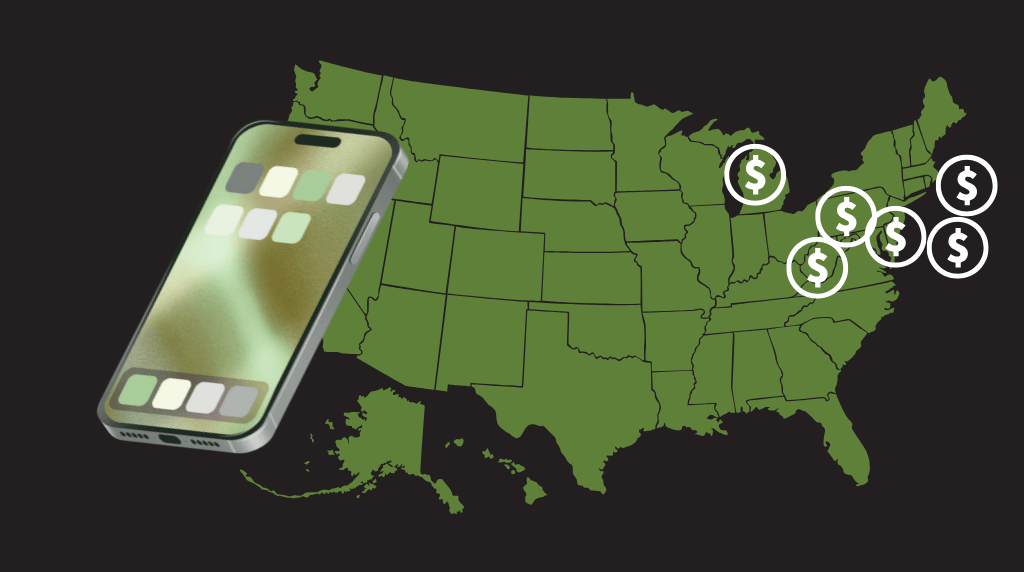Online Gambling License Cost: Full Breakdown
Online casinos are a booming industry, but getting into the industry isn’t as simple as setting up a website and offering blackjack. To legally operate, a gaming company must obtain an online casino license from a regulatory agency.

Gambling license costs and casino license requirements are different in various states. Image created by Dan Holmes, Boone Digital
The online gambling license cost varies widely depending on location, regulatory environment, and business model. But make no mistake—this is not a corner to cut. Without a proper online gambling licence, operators risk legal action, heavy fines, and a shutdown.
The Price Tag: What Goes into the Gambling License Cost?
The gambling license cost depends on multiple factors, including the jurisdiction, the type of games offered, and the operator’s financial standing. Some regions or US states charge a flat fee, while others apply a progressive structure based on revenue.
For example, in Curacao, an online casino license can cost as little as $35,000 per year, making it one of the most affordable options. However, Curacao’s reputation as a light-touch regulatory regime means some payment processors and game providers may be hesitant to work with licensees. On the other hand, jurisdictions like New Jersey or Pennsylvania require a far greater financial commitment, often in the millions, but offer more credibility and access to US players.
Casino License Requirements: A Patchwork of Regulations
Every jurisdiction has unique casino license requirements. Generally, an operator must provide:
- Proof of financial stability
- Background checks on key personnel
- Anti-money laundering (AML) and Know Your Customer (KYC) compliance policies
- Secure, audited gaming software
Regulators want to ensure that legal real money casinos operate fairly and transparently. This often means submitting to rigorous scrutiny before approval. Casino license requirements sometimes include partnering with a land-based casino, as seen in certain US states.
US States with Legal Online Casinos—and Their Licensing Costs
In the United States, online gambling is not federally regulated; it’s left to the states. Currently, only a handful of states allow legal online casinos, and each has its licensing structure and costs.
New Jersey
New Jersey was one of the first states to legalize online gambling, and its regulatory framework is one of the most robust. The online gambling license cost in New Jersey is steep:
- Initial licensing fee: $100,000
- Annual renewal fee: $250,000
- Tax rate: 15% on gaming revenue, plus an additional 2.5% for the Casino Reinvestment Development Authority
Operators must partner with an existing Atlantic City casino, making market entry more complex but ensuring compliance with stringent state regulations.
Pennsylvania
Pennsylvania follows a similarly strict approach, but the gambling license cost is even higher:
- Initial licensing fee: $4 million per category (slots, table games, poker)
- Annual renewal fee: Variable, based on revenue
- Tax rate: 54% on slot revenue, 16% on table games
This high cost makes Pennsylvania one of the most expensive states to enter, but it also boasts a large population and strong market potential for legal real money casinos.
Michigan
Michigan, a more recent entrant into the legal online gambling space, offers a competitive yet costly environment:
- Initial licensing fee: $150,000
- Annual renewal fee: $50,000
- Tax rate: 20%-28% on gaming revenue, depending on earnings
Casino license requirements in Michigan include partnering with a commercial or tribal casino. Despite the costs, Michigan has quickly become a top-performing state for online gambling.
West Virginia
West Virginia’s model is less expensive but still requires significant investment:
- Initial licensing fee: $100,000
- Annual renewal fee: $100,000
- Tax rate: 15% on gaming revenue
West Virginia’s costs are modest compared to Pennsylvania, but the state’s smaller population limits revenue potential.
Connecticut
Connecticut’s approach to online casinos is unique. The state has agreements with two tribal casinos—Foxwoods and Mohegan Sun—which operate under state regulations.
- Initial licensing fee: Not publicly disclosed
- Tax rate: 18% on online gaming revenue, rising to 20% in five years
Unlike other states, independent operators cannot simply apply for a license; they must work within the tribal framework for an online casino license.
Delaware
Delaware operates all legal online casinos through its state lottery, meaning no private operators can apply.
- Revenue split: Operators must work with the state lottery and share earnings
- Tax rate: 43.5% on net revenue
Because Delaware’s market is so small, it isn’t a primary target for new entrants, but it serves as an example of how different states structure their licensing.
Choosing the Right Jurisdiction
For operators considering where to obtain an online casino license, the decision comes down to budget, target market, and regulatory preferences. Some choose offshore jurisdictions like Malta, Gibraltar, or Curacao to avoid the high costs of US licensing, while others invest heavily to gain access to regulated American markets.
A state like Pennsylvania may deter smaller operators due to its steep gambling license cost, while West Virginia offers a more affordable entry point. However, states with stringent requirements—like New Jersey—also provide the credibility that players trust.
The online gambling license cost is more than just a price tag—it’s an investment in legitimacy, security, and long-term success. Legal online casinos must comply with strict regulations, and while offshore licenses may be cheaper, they come with risks related to payment processing and player trust.
Understanding casino license requirements and the costs involved in different jurisdictions is crucial for businesses serious about entering the industry. Whether aiming for the high-revenue markets of Pennsylvania and Michigan or the lower-cost but smaller West Virginia, licensing is the first and most essential step to operating a legal real money casino.



